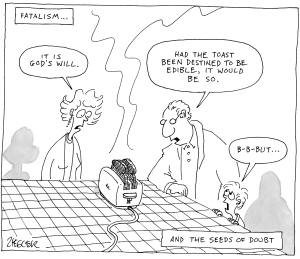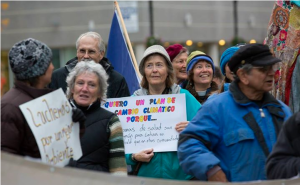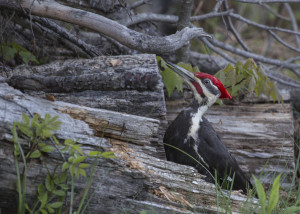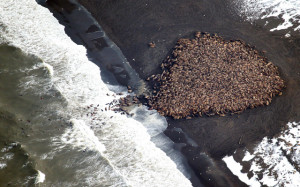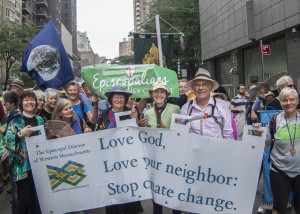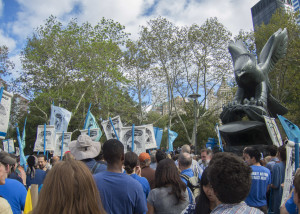There are countless reasons to lament and lose heart. Scan the headlines and take your pick: racism and torture; hunger and sickness; poverty and war; a web of life that is unraveling. I know a woman who heard one piece of bad news too many, and found herself walking around her house, howling.
I give thanks for her wails, for her willingness to be pierced by the suffering of the world and to let herself lament. It takes courage to lament. I dispute the injunction attributed to labor organizer Joe Hill, who reportedly said, “Don’t mourn, organize.” I advocate for both: let’s mourn and organize. It seems to me that allowing ourselves to mourn is a good way to keep our hearts supple and soft, and a good way to resist the pressure to go numb. Shedding tears is a way to water the soul. And mourning can be an act of resistance too, a way of shaking off the dominant consumer culture, which prefers that we stay too busy, distracted, and anesthetized to feel a thing.
From within our grief, a Spirit is moving among us, inviting us to dream big dreams and imagine new possibilities. Especially in this Advent season, Christians look ahead with hope for Christ to be born afresh within us and among us. What can you do – what can I do – what can we do together – to help this birth take place and to heal a hurting world? How is the Spirit inviting us to join the movement for justice and renewal that is already in our midst, sprouting like tender, new leaves on a tree?
Here comes a list of four sightings of the Spirit by just one person in just one week – and an invitation for you to take part.
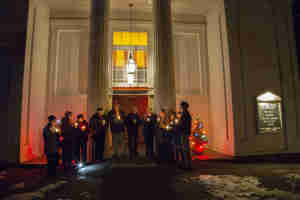
- In the hills of western Massachusetts, a small group of people gathers outdoors on a December night. Under a dark sky, we light candles. Surrounded by quiet, we sing. We are only a handful of intrepid souls as we stamp our feet and blow on our fingers to keep warm in the cold night air. But inwardly we are warmed by the knowledge that people all around the world tonight are doing just what we are doing: praying for the climate talks in Lima, Peru.
Our #LightforLima vigil on December 7 was one of scores of vigils that were carried out in more than 15 countries on four continents. For two weeks, world leaders met in Peru to lay the groundwork for the climate treaty that will be finalized in Paris in 2015. Coordinated by OurVoices.net, a multi-faith, global climate campaign, the global vigils responded to Archbishop Desmond Tutu’s call to kindle “a light for Lima.” Religious leaders and organizations were vocal at the Lima climate talks. Pope Francis directed a radio address to the President of the conference, calling climate change a serious ethical and moral responsibility. And Anglican bishops prayed and fasted for the climate.
Please commit to pray for the success of the U.N. climate talks as we approach the decisive Paris climate negotiations in December 2015. As it stands right now, the deal that negotiators worked out in Lima is not sufficient to prevent the atmosphere from warming more than 3.6 degrees Fahrenheit over the pre-industrial average, the point beyond which the world would tip into perilous, irreversible effects. In the months ahead we will need the sustained, urgent, openhearted, and full-bodied prayers and political pressure of millions of people.
To add your name as a person who will pray, please sign up with OurVoices.net.
The spirit of the Lord God is upon me… [God] has sent me to bring good news to the oppressed, to bind up the brokenhearted…[and] to comfort all who mourn. (Isaiah 61:1-2)
- Leaning forward in a circle of chairs and listening intently, seven Christian leaders from across New England meet in a Framingham retreat house to pray, dream, and strategize. How can the larger group to which we belong, New England Regional Environmental Ministries (NEREM) become a catalyst for societal change and a transformed church? How can we inspire a spiritual awakening in the face of climate change?
We ponder the fact that hearing a trusted pastor preach about climate change is often what moves churchgoers to accept that climate change is real and to take action to slow it. Yet many parishioners have never heard anyone preach about climate change. In my travels from church to church, I often meet with groups of parishioners and I often ask who has heard a sermon about climate change. In most such gatherings, not a single hand goes up.
I won’t disclose what NEREM envisions for next year, but now is the time to start preaching and hearing good sermons about climate change. One way for clergy to begin is to sign up to join the National Preach-in on Global Warming, sponsored by Interfaith Power & Light, which will be held on the weekend of Valentine’s Day, February 13-15, 2015. The Website is full of resources, with sermon ideas, prayers, discussion and activity ideas. Or pick another date. The date doesn’t matter. What matters is conveying the urgency of the hour.
“…to give them a garland instead of ashes, the oil of gladness instead of mourning, the mantle of praise instead of a faint spirit.” (Isaiah 61:3)
- On a Wednesday night in the city of Springfield, Massachusetts, a diverse group of concerned citizens – Hispanic and white, wealthy and low-income – meets to strategize how best to implement and fund a climate action plan for the city. The leaders of this effort – Arise for Social Justice, the North End Organizing Network and Climate Action NOW – have organized the Springfield Climate Justice Coalition.
Back in October we held a march through the city’s streets, gathered 200 people for a rally on the steps of City Hall, and rejoiced when the City Council unanimously passed a resolution to adopt a Climate Justice Plan for the city and to establish a staff position to carry it out. Now comes the hard work of building a grassroots base to ensure that the mayor, Dominic J. Sarno, implements the resolution. Over pizza and oranges we exchange ideas, jot notes on newsprint, and start to divvy up tasks.
At the end of tonight’s meeting, I invite everyone to stand up and take each others’ hands. I feel awkward. This coalition seems so fragile and new. Can we, should we, pray together? I look around the circle of friends and strangers, take a breath, and speak briefly about the traditional Christian virtues of faith, hope and love. In fighting for this city, we express our faith that we can imagine a better future; we share our hope that we can build that future together; and we manifest the love that gives us strength. I ask God’s blessing on our work, and pray that our work will be a blessing for the city.
If you would like to join the Springfield Climate Justice Coalition, please contact Michaelann Bewsee (michaelannb (at) gmail.com) of Arise for Social Justice, or Susan Theberge (susantheberge (at) comcast.net) of Climate Action Now.
“They shall build up the ancient ruins, they shall raise up the former devastations; they shall repair the ruined cities, the devastations of many generations.” (Isaiah 61:4)
- Beside a busy intersection in downtown Northampton nearly a hundred people gather on Saturday for an emergency protest rally to stop the Keystone XL pipeline.
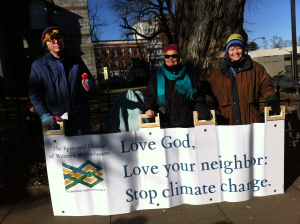
A creative spirit is at play among us: the rally features a tuba and an enormous black plastic pipeline, placards full of pointed messages (“There is No Planet B”), and opportunities for singing, chanting, and banging pots and pans to make noise. We mark four-and-a-half minutes in silence, too, remembering that the body of Michael Brown, a black teenager, apparently lay on the ground for four and a half hours after he was shot by a white policeman in Ferguson, Missouri. The movement for climate justice is intimately linked to the quest for social and racial justice.
The climate rally’s most combative moments are provided by a loud-mouthed, fat-cat banker who wears a top hat and a suit festooned with fake money. She strides up and down the sidewalk, carrying a mini-pipeline on her shoulder, from which dangles a cloth doll, several small stuffed animals, and the placard “R.I.P.” She launches into a rousing debate with a 7-foot-tall polar bear. Is the Keystone XL pipeline safe? Will it make us energy independent? Will it create lots of jobs? Will it protect the climate?
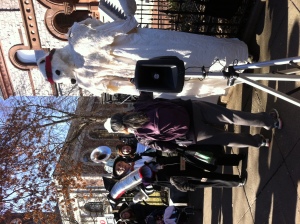
Despite the sneers of Mr. Money-Bags, the patient arguments of the polar bear win the day. The proposed Keystone XL pipeline, which would run from Alberta, Canada to the Gulf Coast, would carry toxic tar sands that would then be shipped for export overseas. The pipeline would allow the most polluting oil on earth to reach world markets. Mining this oil is already destroying the land, water, and health of the people and wildlife of Alberta. The new pipeline creates a risk of spills – the first Keystone pipeline spilled 14 times in its first year of operation. Experts estimate that the pipeline would provide only 50 permanent jobs. And according to NASA scientist James Hansen the pipeline would propel us into a catastrophic level of climate disruption.
Thousands of citizens across the country have signed the Keystone XL Pledge of Resistance. Please consider adding your name and pledging to join in non-violent direct action to stop the pipeline.
If you wish to participate in and to receive updates about events in western Massachusetts tied to the national Pledge of Resistance campaign – including a training meeting on January 3 – please email Dave Roitman (droitman1(at)verizon.net). We expect to carry out an act of non-violent civil disobedience sometime between mid-January and March. It will be timed so that it happens on the same day that 97,000 other people take action, as part of the national Keystone XL Pledge of Resistance. A short fact sheet about the pipeline by Friends of the Earth can be downloaded here.
“For as the earth brings forth its shoots, and as a garden causes what is sown in it to spring up, so the Lord GOD will cause righteousness and praise to spring up before all the nations.” (Isaiah 61:11)
In the face of the confusion, brutality, and violence of the world, we grieve and mourn. And we also mobilize, strategize, and organize. In our longing for a just and peaceful world, we trust that we share in God’s longing to bring forth “a new heaven and a new earth” (Revelation 1:1). As Brian Swimme writes in his “Canticle of the Cosmos”:
The longing that gave birth to the stars
The longing that gave birth to life
Who knows what this longing can give birth to now?
